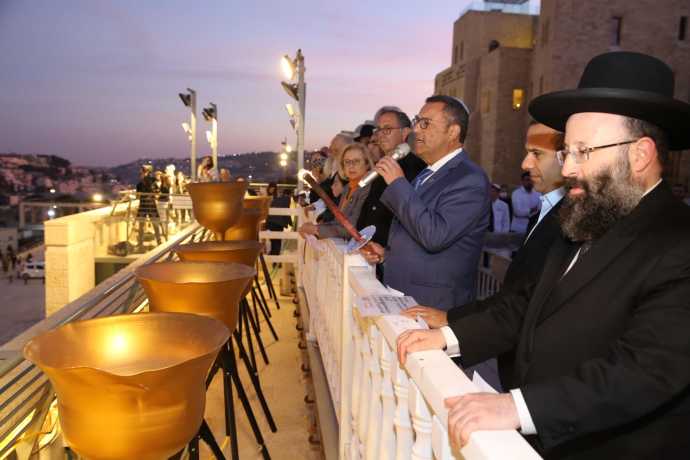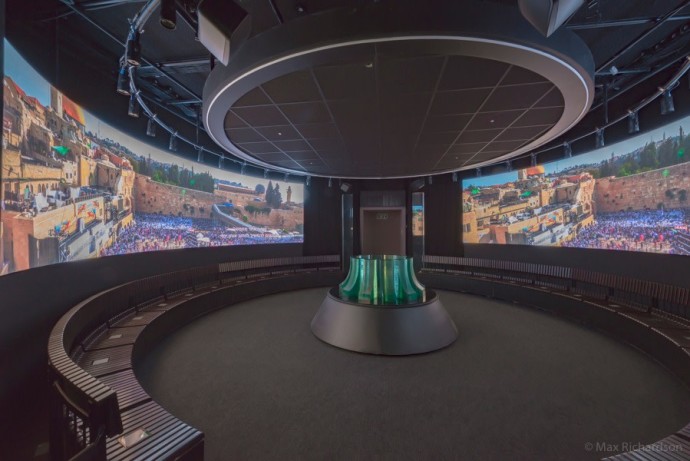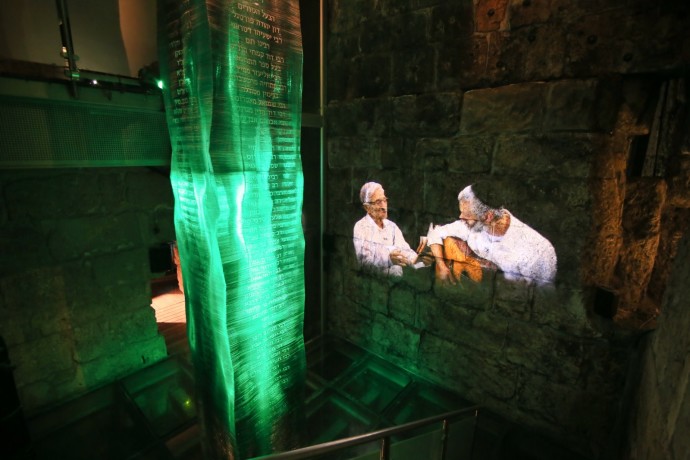Combining the use of technology in the service of spirituality can be tricky. Says a leading staffer at the Western Wall Heritage Foundation, “Our goal is to take technology and use it appropriately. Digital services should strengthen the visit.” Technology at the Western Wall should not get in the way of the spiritual experience, but rather complement and augment the visit to one of Judaism’s holiest sites.
Modern video technology was first used at the Western Wall over 25 years ago, when various organizations installed cameras that provided a live remote feed of the Wall and the Western Wall Plaza.
Today, live remote cameras are still in place at the Wall and available at the Western Wall Heritage Foundation website at thekotel.org. Over the years, a number of significant and valuable additions have been made at the Western Wall that enrich the experience for visitors.

What digital services are available at the Western Wall, how do they enrich the visit to the Wall, and what is planned in the coming years? Following is a summary of the digital experiences that are available at the Western Wall, and a preview of what is coming soon.
“A Look into the Past – Virtual Reality Experience”
“One who has not seen Herod’s Temple,” says the Talmud, “has never seen a beautiful building in his life.” King Herod, the Roman-appointed King of Judea, refurbished and restored the Temple during his reign. While the beauty of the Second Temple is long gone – it was destroyed almost 2,000 years ago – the Virtual Reality Experience, adjacent to the entrance of the Kotel Tunnel Tours, enables visitors to see the beauty and grandeur of the Temple from a 360-degree perspective using advanced virtual-reality technology. Visitors don virtual reality goggles to experience the Temple in all its glory.

“Journey to Jerusalem”
Located in a special room in the Western Wall Tunnels that was previously used as part of a Mamluk inn, Journey to Jerusalem is an interactive experience that enables viewers to follow their ancestors through the Diaspora on their journey back to Jerusalem. Participants use computers to track historical events from the destruction of the Temple until the return to Jerusalem and its reconstruction in modern times, via an interactive program that includes dozens of video clips. Participants experience and sense the dilemmas encountered by Jews in various countries and throughout history, encountering critical points in time along this journey when serious decisions had to be made.
“The Chain of Generations”
Utilizing music, sculpture, sound and light effects, and archeology, the Chain of Generations Center is an interactive exhibit that tells the story of the Jewish people over a span of 3,500 years. The Center is divided into several rooms that tell the story of different periods in Jewish history. Each room contains layers of glass illuminated by rays of light, which are integrated into the sound and light effects of the exhibit. Fascinating archeological finds discovered during the center’s construction, such as a wall from the period of the First Temple, a ritual bath (mikveh) from the Second Temple, and Crusader-era walls are integrated into the exhibit itself.

Virtual Tours of Western Wall Tunnels
Introduced during the first days of the pandemic, the Western Wall Virtual Tunnel experience provides a virtual tour of the famous Kotel Tunnels from the convenience of home. The tour features state-of-the-art technology in a 3-D tour with an online guide explaining the underground discoveries of the Kotel Tunnels that convey the history of the Jewish people.
Sending prayers to the Western Wall – Virtually
The time-honored and ancient custom of writing personal prayers and inserting them into the cracks of the Western Wall can be accomplished digitally via the Western Wall Heritage Center’s website.
Prayers submitted online are printed and placed between the stones of the Western Wall.
The Future of Digital at the Western Wall
The Western Wall Heritage Foundation's website is being redesigned to enable visitors to spend their time more meaningfully at the Western Wall. Soon, it will enable visitors to plan and schedule their visit to the Western Wall, based on the amount of time that they have available.
The website will take into account the various types of visitors who are interested in the Western Wall. Some want to visit the Western Wall virtually. Others plan an in-person visit to Israel and the Wall and want to plan their visit to the Kotel in advance. A third group of people consists of people who are actually already at the Western Wall Plaza. Finally, the fourth group comprises those who want to maintain their connection to the site after their visit. The new website will enable visitors from all four groups to plan their visits accordingly.
The Western Wall Heritage Foundation will soon be adding an augmented reality (AR) component for visitors to the Western Wall. Within the next few months, visitors to the Kotel will be able to point their smartphone camera at the area of the Western Wall, click on a link, and view augmented reality images of the Temple integrated into the current view of the Western Wall today. In addition, visitors at the Kotel will be able to click on video links to watch short, explanatory videos explaining Jewish practices, such as prayer, to learn more about the rituals that are conducted at the Wall.
The use of technology at the Western Wall is a long-range project, and over the following weeks, months and years, the Western Wall Heritage Foundation will be introducing new features and technology to truly make the site, in the words of the prophet Isaiah, “A house of prayer for all peoples.”
The Western Wall is also known as the Wailing Wall or the Kotel

